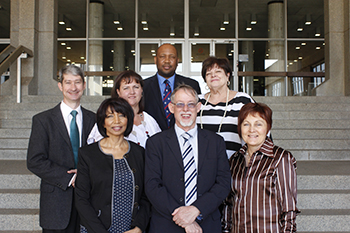Latest News Archive
Please select Category, Year, and then Month to display items
23 June 2023
|
Story Naledi Filita
|
Photo Supplied
 Naledi Filita is an nGAP Lecturer in the Department of Languages in Education.
Naledi Filita is an nGAP Lecturer in the Department of Languages in Education.
The University of the Free State (UFS) is celebrating Youth Month by showcasing the positive influence of the institution on career development. As part of this initiative, we are sharing the stories of UFS alumni who are now working at the university.
Naledi Filita, nGAP Lecturer in the Department of Languages in Education, shares her UFS journey:
Q: Year of graduation from the UFS:
A: 2016, 2018, and 2021.
Q: Qualification obtained from the UFS:
A: Bachelor of Education, Postgraduate Diploma in Education (Curriculum Studies), and Master of Education (Curriculum Studies).
Q: Date of joining the UFS as a staff member:
A: 2021.
Q: Initial job title and current job title:
A: Lecturer.
Q: How did the UFS prepare you for the professional world?
A: I started my career as a teacher in 2015 and was later appointed to my current job. The UFS has equipped me with the knowledge and skills that enabled me to be competent in my field in various contexts. My journey as a UFS student equipped me with crucial skills, such as critical thinking, communication, teamwork, and organisational skills.
Q: What are your thoughts on transitioning from a UFS alumnus to a staff member?
A: It has been a wonderful experience so far. I was once a student teacher at this university. Due to my experiences, being able to instil knowledge and skills in student teachers is something that I am passionate about. I am grateful for the developmental opportunities and support that I receive as a young researcher.
New schools, restructuring part of streamlined Faculty of Health Sciences
2017-10-12

From the left, front are: Dr Jocelyn Naicker,
Prof Gert van Zyl, Prof Magda Mulder;
back from left: Prof Chris Viljoen,
Marlene Viljoen, Deputy Director: Faculty of Health Sciences;
Prof Nathaniel Mofolo; and Prof Santie van Vuuren.
Photo: Rulanzen Martin
Numerous developments, such as the creation of two new schools and one newly restructured School of Medicine in the Faculty of Health Sciences at the University of the Free State (UFS), will catapult this renowned faculty to even greater heights.
Five-school structure to increase access
A five-school structure was proposed at the annual Faculty Management retreat in July 2016. The previous three-school model included the Schools of Medicine, Nursing, and Allied Health Professions.
The current School of Medicine has been restructured and will henceforth be known as the School of Clinical Medicine. The Schools of Pathology and Biomedical Sciences have been added to the faculty. “So, three new schools were in fact created within the faculty,” said Prof Gert van Zyl, Dean of the faculty.
“There was also a request from the National Health Laboratory Services to group academics that is rendering services in pathology into a new School of Pathology.” This is what motivated the faculty management to create two new schools.
Esteemed academics appointed
With the creation of the new schools, there were also new appointments within the Faculty of Health Sciences. Dr Jocelyn Naicker has been appointed as the new part-time Head of the School of Pathology, Prof Chris Viljoen was appointed as the part-time Head of the School of Biomedical Sciences, and Prof Nathaniel Mofolo as the new Head of the School of Clinical Medicine. Prof Santie van Vuuren remains Head of the School of Allied Health Professions, and Prof Magda Mulder as the head of the School of Nursing.
Research outputs to remain as usual
The addition of the new schools will not impact research output. “In the past, research was done across departmental boundaries between all the departments in the faculty,” Prof Van Zyl said. The advantages of adding two additional schools are that the workload will be distributed among the five schools. The heads of schools will work within their respective disciplines and related areas, and will eliminate the duplication of administrative functions.